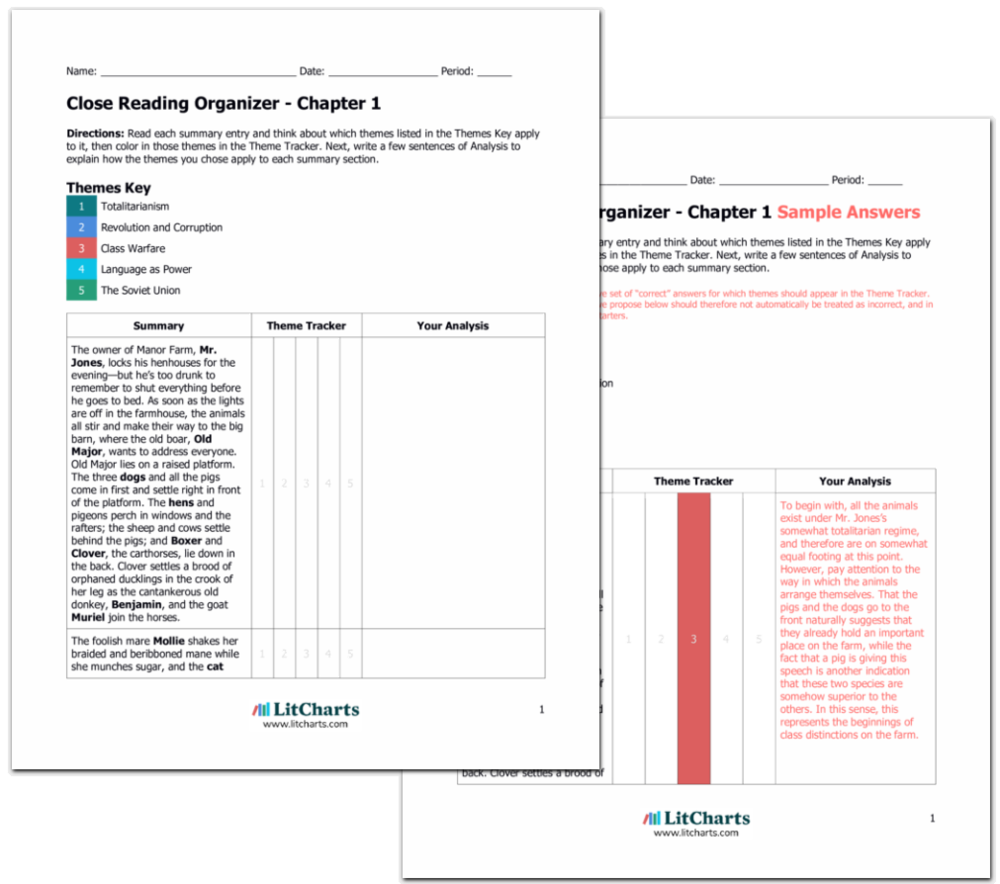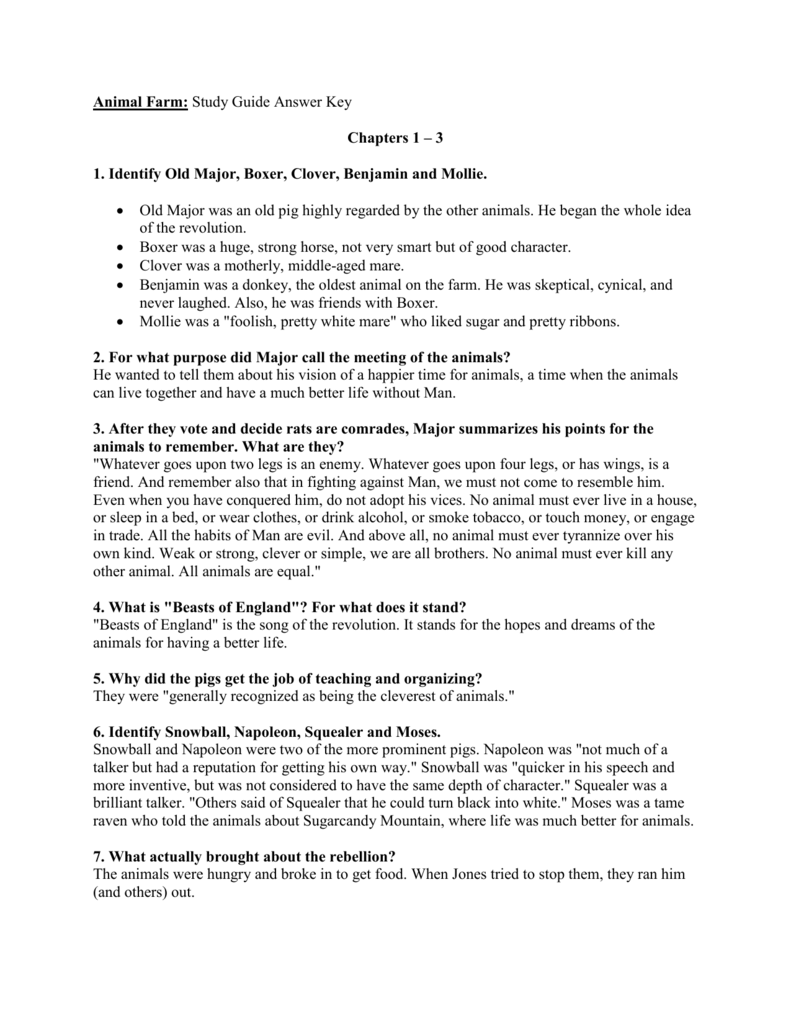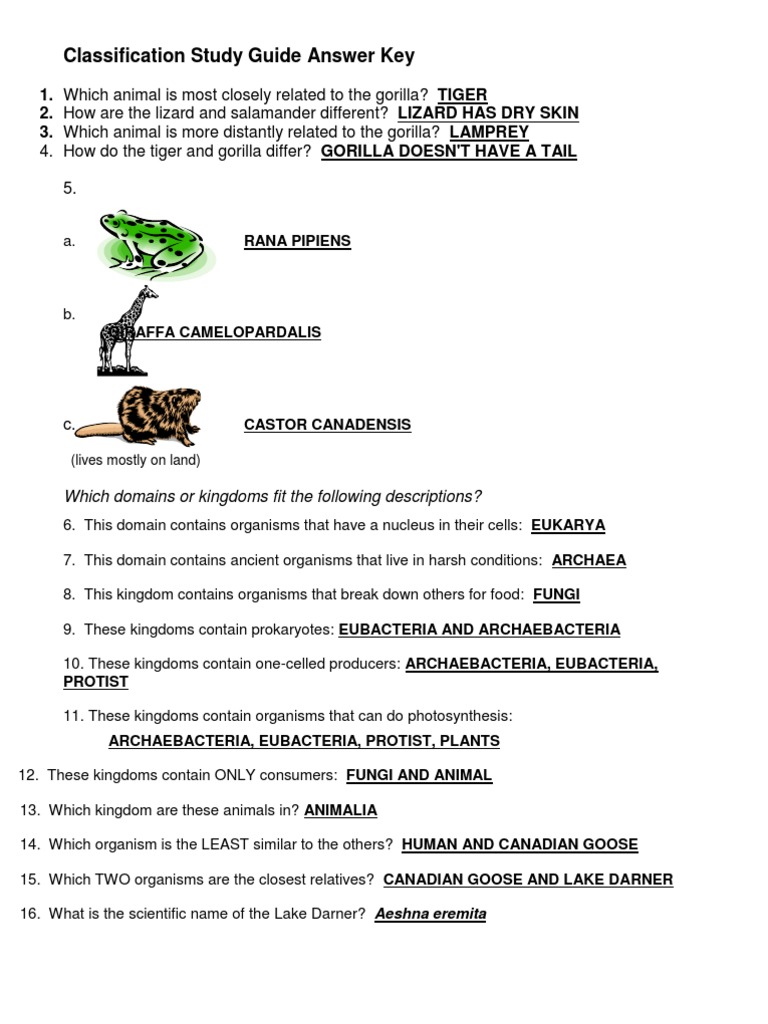| Mr. and Mrs. Jones | Own The Manor Farm; Mr. Jones is selfish in that he does not always take good care of his animals. |
| Old Major | Prize-winning boar; old; respected by the other animals. |
| Bluebell, Jessie, and Pincher | Farm dogs; Pincher is male. The puppies of Bluebell and Jessie will become Napoleon’s personal guard and hit-squad. |
| Boxer | Work horse who can do the work of three horses; not intelligent, but faithful to principles of Animalism and does what he is told. Has amazing self-discipline and loyalty |
| Clover | Motherly mare; has given birth to four foals but they were sold. Faithful follower of Animalism. Can read only a few letters. |
| Muriel | White goat; she can read better than the horses can, so she reads the Commandments for Clover. |
| Benjamin | Cynical donkey; oldest animal on the farm; refuses to get involved in either side of debates; loyal friend to Boxer. |
| Mollie | Vain and silly mare who pulls the Jones’s carriage whenever they ride into town. She enjoys a life of luxery; leaves Animal Farm to escape the work (traitor |
| Moses | Mr. Jones’s pet raven; a spy and tattle-tale. Animals hated him because he tells silly stories and does no work |
| The Cat | Is interested only in what is best for herself; not trustworthy; totally selfish. |
| Napolean | Lively boar being raised by Jones for sale. Ardent believer in Animalism, organizes committees to accomplish goals; reads Mr. Jones’s books and comes up with idea for the windmill. Leads animals in The Battle of the Cowshed and is wounded. |
| Snowball | Large, fierce-looking boar being raised for sale. He doesn’t talk much but works behind the scenes to get his way. (He’s a sneaky plotter.) |
| Squealer | Most persuasive speaker; can tell animals that black is white and they believe him. Hops from side to side and whisks his tail when he talks. Serves as mouthpiece for Napoleon. |
| The Sheep | Act as a group and have no individual character. They are totally controlled by Napoleon, who uses them to harass anyone who would argue against him. |
| Mr. Pilkington | Owns Foxwood farm. Lives a life of leisure, hunting and fishing, and is careless about his farm. |
| Mr. Fredrick | Owns Pinchfield farm.Tough shrewd man constantly involved in lawsuits; manages his farm very efficiently, cheats Animal Farm; blows up their windmill. |
| Mr. Whymper | A solicitor (lawyer)Liaison between Napoleon and the neighboring farms. |
| For what purpose did Major call the meeting of the animals? | He wanted to tell them about his vision of a happier time for animals, a time when the animals would live together as equals without being controlled or abused by mankind. |
| After they vote and decide rats are “comrades”, Major summarizes his points for the animals to remember. These are the principles of Animalism | *whatever goes on two legs is an enemy; whatever goes on four legs or has wings is a friend;*animals must not come to resemble man;*do not adopt man’s vices—no sleeping in beds, smoking, drinking alcohol, engaging in trade or using money*no animal must tyrannize over another animal*no animal must ever kill another animal*all animals are equal, no matter whether weak or strong, clever or simple |
| What is “Beasts of England”? For what does it stand? | the song that inspires the revolution; it represents the hope of the animals for a better future |
| Why did the pigs get the job of teaching and organizing? | The other animals recognize that the pigs are more clever than the others, so they |
| are trusted to take on the responsibilities of organizing and teaching the others. | … |
| What actually brought about the rebellion? | Farmer Jones had been away all day on business and when he returned he got drunk instead of feeding the animals, so they were very hungry. They broke into the food stores and when Jones and his farm hands tried to chase the animals away from the food, the animals fought and ran the men off the farm. |
| What were the 7 commandments? | 1. Whatever goes upon two legs is an enemy.2. Whatever goes upon four legs, or has wings, is a friend.3. No animal shall wear clothes.4. No animal shall sleep in a bed.5. No animal shall drink alcohol.6. No animal shall kill any other animal.7. All animals are equal. |
| Who gained leadership of the animals? Why? | Someone was needed to organize the animals so that they could work efficiently, and since the pigs were the cleverest, they got this responsibility. |
| Describe the animal’s flag? | The animal’s flag was green to represent the fields, and had a white hoof and a horn on it. |
| What happened to the milk and apples? How did Squealer explain the use? | The pigs were eating the milk and the apples. Squealer explained that all the thinking and planning they were doing required this extra nutrition. |
| What was the Battle of the Cowshed? | Jones with the help of other farmers attempted to take back the farm, but the animals fought them off. |
| What was Snowball’s role in the Battle of the Cowshed? | Snowball was the brave leader in the battle. He planned the animal’s strategies in advance and fought along side them, even being wounded. |
| Describe the relationship between Napoleon and Snowball | they dont agree on anything |
| What topic divided the animals? Which pig was for and which was against? | Snowball introduced the idea of building a windmill that would produce electricity and make the animals’ work easier. He was very ambitious and drew up plans for the windmill. Napoleon looked at the plans, then urinated on them, not saying a word |
| How did Napoleon get rid of Snowball and gain full control of the animals? | Napoleon offered to teach the nine puppies born to Jessie and Bluebell. He secretly trained them to be his personal guard, and then had them chase Snowball off the farm. |
| How did Squealer justify Napoleon’s take-over to the others? | Propaganda: persuaded the animals that Napoleon had their best interests at heart and that he would be like a father and make the best decisions for their welfare—that they might make mistakes if allowed to decide matters for themselves. Since they all agreed that the pigs were the smartest animals, the other animals trusted Napoleon to take care of them. |
| What two sayings did Boxer adopt | “I will work harder” and Napoleon is always right.” |
| Why did Napoleon in fact change his mind and decide to have the animals build the windmill? | He wanted to unite the animals—he won over the followers of Snowball. |
| For what purpose did Napoleon begin trading? | The animals could not produce all they needed to make the windmill work—the mechanical parts—so they needed money to buy these things, therefore, they would have to trade some of their produce. |
| Why did the pigs say they had to move into the house? | They needed a quiet place to work because they had to do so much thinking. |
| Who did Napoleon blame for the windmill disaster? Why? | Snowball was made out to be a spy and sore loser who wanted to destroy the farm since he could not run things his way. |
| Why did the hens have to give up their eggs? | Napoleon needed more produce to sell to get money, so he told the hens that they would get no food until they agreed to give up their eggs. Nine died before the rest capitulated. Though the hens obviously had been starved to death, the pigs put out the story that they had died of an infectious disease caused by living in unsanitary conditions, propaganda aimed at blaming the victims of tyranny for their own deaths. |
| How has Snowball’s role been changed by the end of Chapter 6? | Napoleon with the help of Squealer have convinced the animals that they don’t remember things correctly, and that Snowball had fooled them all because he was really working for the humans from the start to destroy the farm |
| Why did Napoleon begin executing animals? | He wanted to make the animals aware that anyone who opposed him might be executed, so they would be too afraid to question his decisions or argue. |
| Whom did Boxer blame for the executions? What was his solution? | Boxer still trusts Napoleon, so although his mind is troubled, he believes the fault must lie in the animals themselves. |
| Why did the animals sing the “Beasts of England” song slowly and mournfully as they | … |
| were gathered on the knoll? | Even though man had been run off the farm, their dream of a happy future was not coming true. |
| Why was the singing of “Beasts of England” banned? | The song reminded the animals of the original principles of Animalism, and Napoleon wants them to forget. Squealer tells them that the song is silly now because the revolution has been achieved and so they don’t need to sing it. |
| In what ways has Napoleon set himself apart from the other animals? | *He does not mingle with them—no meetings.*has a private room in the house*has special titles (Father of all Animals, Comrade, Napoleon)*has a guard to protect him*poem written in his honor*a food-taster to prevent poisoning*holidays established in his honor |
| How did Frederick cheat Napoleon? | He bought wood from Animal Farm, but paid with forged bill |
| What moved the animals to attack Frederick and his men at the Battle of the Windmill? | They used dynamite to blow up the second windmill. |
| Why was Comrade Napoleon “dying”? | he was drunk and got hug over |
| What special treatment did pigs and piglets get? | Besides eating all the apples and milk, their food rations are not reduced during the hard winter. The other animals must stand aside and give them right-of-way when they are out walking. All the piglets were fathered by Napoleon because he is the only boar (porkers are neutered pigs) and his children get to wear green ribbons on their tails. They also are to have a special school built for them to attend |
| What happened to Boxer? | Boxer worked so hard that his lung gave out and he needed to retire; but Napoleon sold him to the butcher to be killed and made into glue and dog food; Squealor put out the lie that Napoleon had paid for hospitalization, and that Squealer himself had been at Boxer’s bedside when he died. The pigs used the money to buy whiskey. |
| The animals on the farm worked hard. What was their comfort in retirement? | They were not working for man; they were working for themselves and were free. |
| What was Clover startled to discover? | The pigs had learned to walk on their hind legs. |
| What commandment took the place of the Seven Commandments? | All animals are equal, but some animals are more equal than others. |
| What did the other animals see when they looked in to the farmhouse? | They saw the pigs playing cards with the men. Then a fight broke out over a card game, and the animals could not tell the pigs from the humans. |
animal farm chapter 2 reading check
May 1, 2020

Animal Farm Chapters 8-9
May 2, 2020
2010 Simply Novel Animal Farm Literature Guide Answer Key
Access Free Animal Farm Study Guide Answers Key wisdom on its head. Freakonomics is a groundbreaking collaboration between Levitt and Stephen J. Dubner, an award-winning author and journalist. They set out to explore the inner workings of a crack gang, the truth about real estate agents, the secrets of the Ku Klux Klan, and much more. Animal Farm Short Answer Test - Answer Key George Orwell This set of Lesson Plans consists of approximately 96 pages of tests, essay questions, lessons, and other teaching materials.
